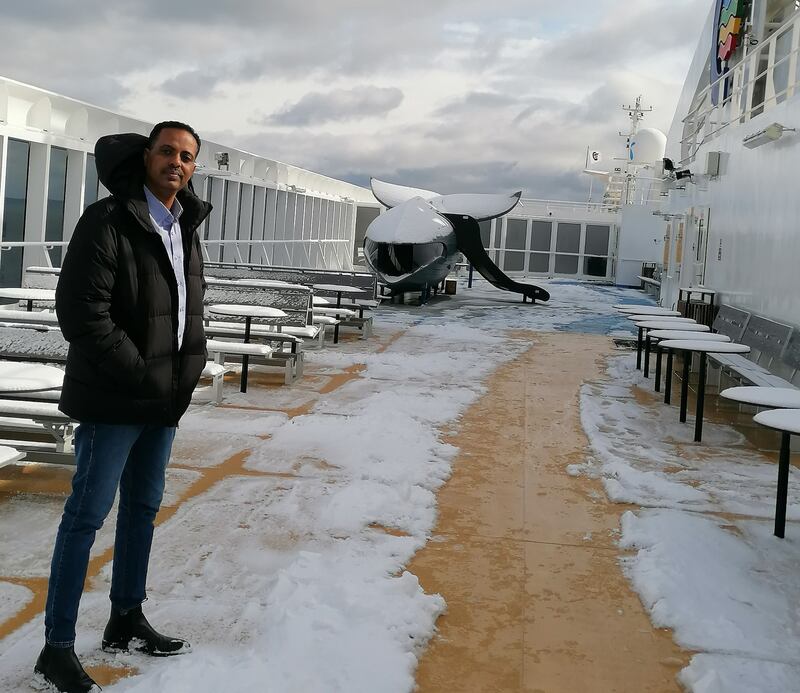We said farewell to Khartoum with broken hearts.
After enduring 40 days of war between the Sudanese Armed Forces and the paramilitary Rapid Support Forces, our family was forced to choose a new beginning.
My sister Ayshah, 30, had lost her baby a few days earlier in what seemed to be a miscarriage caused by stress. She was five months pregnant and it was her second miscarriage in as many years.
Getting help for her was torture.
Our neighbour Murtada took Ayshah, our other sister Fawziyah, 23, and I around the city on his tuk-tuk in the dead of night to find a doctor.
At six RSF checkpoints, which have become commonplace around the city since the outbreak of war in April, we were sent away, told it was too late to travel. We were forced to go into backstreets to avoid the checkpoints but even that proved futile.
By dawn, we found ourselves back home, and Ayshah was crying in agony.
We hoped daylight may change our prospects. That morning we drove 15 kilometres across the city until we found a private clinic, only to discover they wanted 120,000 Sudanese pounds, about $200, upfront to help our sister.
I begged and I begged, explaining there was no way anyone can have that much cash these days and that I was more than happy to pay with my credit card. But they would not budge.

Our next stop was a small government hospital that an elderly man we met at the private clinic told us about. It was in the same district as the clinic.
We made it there and, to our delight, there were doctors on duty. But the hospital was not operational. No power. They called one of the hospital’s gynecologists, who lived a short distance away.
It took her eight hours to come.
In the end, the doctor said the baby must be sacrificed so that my sister, who had by now been crying from pain for close to 24 hours, would live.
My sister reluctantly agreed. She has been heart-broken since.
We don’t know if getting her help sooner, or not living through such a devastating conflict, may have saved her baby.
After such heartbreak, joining the almost two million Sudanese who have fled the war, which had claimed 3,000 lives by the third week of June, felt like the only option.
This absurd conflict has pushed hundreds of thousands of Sudanese into a kind of homelessness – at least 2.2 million by the latest UN count, of whom more than 500,000 went to neighbouring nations and the rest elsewhere in Sudan.
They got up and left to be safely away from the bullets, the shelling and the air strikes. It’s the kind of war that made everyone curse, even hate, both adversaries.
A few days before we left, my father, who is 68, called me into his room. “Take us out of here, my son. Take us anywhere away from here,” he told me in a sombre and hurt voice. “Thanks be to God, your sister is better now, so we can leave.”
Escape from Khartoum
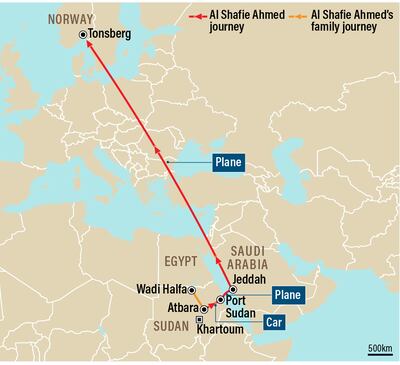
We left Khartoum in a minibus; me, my parents, Ayshah, Fawziyah, Areej, my other sister who is 18, my brother Muhanad, my fiancée Asmaa, 23 and her mother.
Our journey out of Khartoum and on to the road north was fraught with danger because of the air strikes, the artillery shells and the menacing attitude of RSF fighters manning checkpoints.
We left our Sharq El Nile home in the east of the city at dawn.
The call for the first of the day’s five prayers was punctuated by the sound of artillery shells and heavy gunfire.
We drove past Station 13, the name of a major juncture in Sharq El Nile, where fighting turned the ground black.
Our 350km journey to Atbara began with negotiating our way through 11 RSF checkpoints. In the end, it took us eight hours to get out of Khartoum, a journey that usually takes 40-to-45 minutes.
If we were ever faltering on our decision to leave, one glimpse out of the window affirmed our choice.
We saw countless bodies littering the streets. Some were beginning to decompose or look to have been partially mauled, most likely by packs of stray dogs who normally survive on people’s kindness or their rubbish.
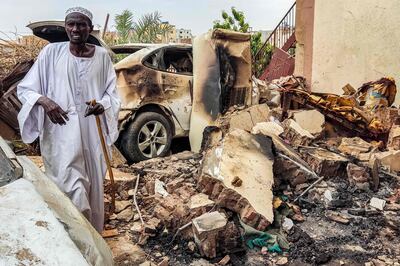
Many of those bodies sat in the middle of pools of dried blood, its colour faded by Khartoum’s scorching sun. But there was no sign of army troops anywhere.
Not even in my worst nightmares did I imagine that one day I would see dozens of dead bodies scattered around the streets of the city where I was born and grew up.
Curiously, it seems that some of the city’s residents have learnt, most likely out of necessity, to ignore the danger lurking across the city and get on with their lives.
Some street hawkers are back on pavements. The city’s famous tea ladies are brewing up while gunfire is ringing out close by.
I think taking the war for granted and trying to live a normal life while it goes on around us is an unhealthy approach. It means that the value we place on our lives has somewhat diminished.
On the whole though, the once bustling city was like a ghost town. Several fires were raging unabated, mostly government offices, facilities or fuel depots struck by artillery or air strikes.
Families nervously wait for a ride out of the city at street corners. Sitting next to them is invariably a heap of luggage and large bags stuffed with what could not go into the suitcases.
Here's what a Dubai doctor saw happening in Sudan before he escaped
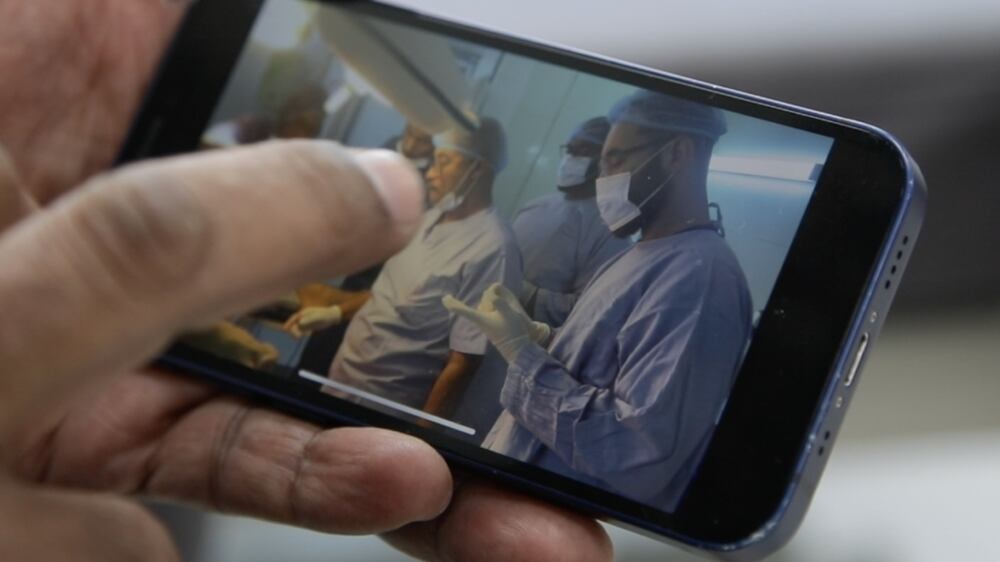
We could see others walking away with looted items, like office furniture and television screens. They seemed at pains not to make eye contact with anyone they walk past.
The smell of smouldering fires was everywhere.
The realisation that images of the worst of the destruction and death wrought on Khartoum were not reaching the outside world weighed heavily on my mind.
Understandably, the few television news crews still operating in the city are unable to access areas where the worst of the fighting is taking place on a daily basis. I guess what I am saying here, is that the situation is so much worse than the world thinks.
In the days before our departure, some of our neighbours ran out of food. They knocked at the doors of others asking for help. Several came to our house. We shared some of what we had cooked, but we felt the need to hold on to as much as we could because there was no telling how long this war would last.
I wanted to document the journey with my mobile phone, but I knew better than that.
RSF fighters have been commandeering mobile phones at their checkpoints. Sometimes, if they saw photos or videos of their men or their military hardware, they casually make accusations like spying for or sympathising with the army. I kept the phone well hidden.
Life goes on elsewhere in Sudan
The last checkpoint in Khartoum was near the RSF-held Al Geely oil refinery in the north of the city. We planned to head from there to Shindy and then Atbara.
Hundreds of cars and buses snaked down the road, people with anxious faces staring from their windows. As far as I could tell, the passengers were mostly elderly men, women and children.
I felt kinship with the other passengers. They, like us, have just said goodbye to their homes and neighbourhoods and, as of now, they have little, or no, hope of going back.
The road to Atbara was safe and free of checkpoints, but the price of relative safety is a lack of amenities, cafes or shops. Not even petrol stations were open for the three-and-a-half-hour drive.
Atabara is nicknamed the city of fire and iron because of its role as a railway hub. It is named after a main tributary of the River Nile. Unlike wartime Khartoum, we found Atbara to be fully operational.
The markets and banks are open for business. Government offices are operating as usual and the streets in the city centre are packed.
Almost everything about Atbara was the opposite of what Khartoum has been like in the past seven weeks. The city’s normality surprised me. For some reason, I just did not expect it.
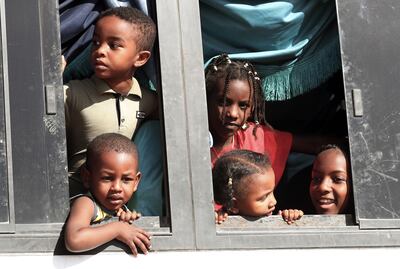
We dropped Ayshah at Shendi on the way to Atbara. There, she joined her husband at the family home. Her in-laws laid down a rich meal for us. We said goodbye to Ayshah and resumed our journey to Atbara.
We stayed with my 80-year-old grandmother, also named Ayshah, at Atbara. Everyone except me spent five days there because my parents needed to rest.
The next stop for them – except for my father and brother Muhana whose passports expired and could not be renewed in Khartoum because of the war – was to be Wadi Halfa and then Egypt, a country our family has long viewed as our second home.
Trouble at the border
Egypt requires males between the age of 19 and 49 to have a visa, whereas everyone else gets a visa on arrival. I did not have a visa and, subsequently, I had other plans.
After one night in Atbara, I bid everyone farewell and headed to Port Sudan, the army-controlled Sudanese city on the Red Sea. I travelled there with friends from one of Sudan's security agencies. They took me straight to the port, where I was able to immediately join hundreds of people escaping the war aboard a Saudi navy vessel to Jeddah across the sea.
Like Port Sudan, I hardly spent any time in Jeddah. I went straight from the seaport to the city's main airport and caught a flight to Frankfurt and on to to Norway, for which I have a valid visa.
Saudis and other civilians leave Sudan on ships to Jeddah
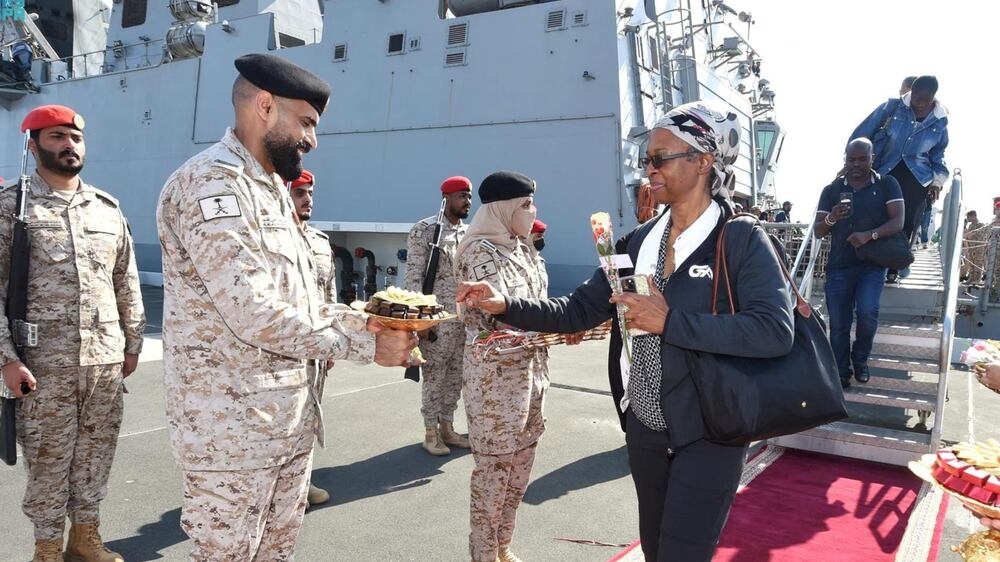
What happened to the rest of my family was unexpected.
My family arrived at the border crossing with Egypt on June 8 knowing that new entry regulations decreed by Cairo requiring that every Sudanese citizen needs an advance visa regardless of age or gender would go into effect two days later.
They rested overnight at the no-man’s land after they cleared passport control and customs on the Sudanese side. When they arrived at the gate of the Egyptian side early the next day they were told to come back at 10am. They went back on time only to be told to return three hours later.
When they did, the Egyptian guards told them the crossing was closed.
They had no choice but to return. This time, they went to Wadi Halfa, the nearest town to the Egyptian border where we have many relatives.
There they applied for visas at the Egyptian consulate, but the situation is hopelessly chaotic, with long lines and no clear or efficient processing system.
Asmaa, my fiancee, sends me tearful voice notes every day. She says she joins the line outside the consulate at 5am every day until late afternoon, when she returns home in despair after not making any progress.
She is very upset and, for reasons unknown to me, she is blaming me. I think she is just very tired.
In retrospect, they should not have stayed so long in Atbara. Two days would have been enough, but my father was reluctant to let the women travel to Egypt without a male chaperone. He gave in at the end after I assured him that I will have someone meet them on the Egyptian side and escort them all the way to Cairo.
I am still hoping to marry Asmaa, who is a medical doctor, on July 3 in Cairo. But it's looking more and more unlikely now with every passing day. If we were to marry on that date, she should have been in Cairo for one or two weeks by now preparing for the wedding.
I have contacted the Egyptian embassy in Sudan to seek help. They gave me assurances they would issue my mother, Asmaa and her mother visas, but I don't think that either of us wants to have a wedding without our entire families present.
I have not been able to sleep much lately. I am consumed with worry. Too much is going on and none of it is good or promising.
On the upside, I obtained a five-year residence visa in Norway, where I have a full scholarship to study. The university found me temporary accommodation since I cannot move to the students' residence halls before the academic year starts in September.
I also secured a visa for Egypt from the embassy in Oslo.
In September, I will start attending language courses, a requirement before I start my master's degree here in media studies.
I still have hope that everyone will make it, God willing, to Cairo, wedding or not.
As told to Hamza Hendawi, The National's Senior Correspondent in Cairo.
